- Home
- Tennessee Williams
The Traveling Companion & Other Plays Page 7
The Traveling Companion & Other Plays Read online
Page 7
WOMAN: Restlessness! Irritable nerve-ends! Inflamed! Ha. The concave needs the convex like a famished mouth needs feeding.
[The monsoon wind rises: there is a wild fluttering of rice-paper strips.]
WOMAN: Hmmm. [She crosses her legs tightly.] Want, crave, need, deep in me! [Turning down a white glove, she glances at her wrist.] My lunatic keeper is late on The Ginzah today. By this hour he usually appears on the street, stumbling along it in panicky pursuit of me, his fierce eyes blazing blue-white as the center of flame, the eyes of a Goth, a Hun, a—broken Attila. —Did I break him? Maybe. As he broke me. Unable to save each other, we struck at each other with an equal fury . . . Bull! A woman of my breed can’t be broken that easy. The blood of a people that sprang from volcanic islands, fiery as my unsatisfied— [Pause. She places a gloved hand slowly over her groin.] —holds me still intact while he crumbles to bits . . . [She crosses her legs in the other direction. She touches her groin again.] And yet I’m here alone in spite of the four calls from casual lovers whom I’ve used in place of “The Man” to pacify for a while my— [She lifts her hand from her groin and drops it again with force.] I almost seem to be considering—not surrender, but—cease-fire . . . Is he searching for me or am I waiting for him? Sitting on The Ginzah, alone, waiting till he finds me, or I, as if accidentally, come across him, with a fake look of displeased surprise? —If love is need, and what is it if it isn’t, aren’t I the one who loves more? He has his work, even if he’s gone in his head and paints, now, with a spray-gun, and I, what do I have, what have I got from this man who asks, who demands, that I give him all of me in return for half of what’s left of him? And with no legal position while he’s living or after he dies? —But I’m not afraid of him but for him. It seems that I —love “The Man” . . .
[Strips of painted posters flutter wildly again. The woman shuts her eyes tight, then opens them wide.]
WOMAN: —These ideographs! A language printed in simplified picture-images . . . . If they put me into an ideograph, I’d be a thing hanging naked, yes, a line-drawing in colored ink of a naked thing, outlines in cool color but not color here—and here . . . [Her gloved hands touch her breasts and groin.] —Oh, this calls for—
[She pours a cup of steaming tea. A Stage Assistant enters and stands beside the table with a large paper poppy as the woman opens a laquered box, removes from it an opium pellet and drops it in the tea.]
WOMAN: —a pacifying pellet of the stuff they extract from the seeds of— [She points to the large paper poppy suspended over her. The Second Stage Assistant exits with the poppy.] —Hmm. They translate time into moons here. Everything is the moon of something or other. —And this is my moon of fertility. Oh, I keep up a cool front, but the barren emptiness of my— [She curves her gloved hands over her abdomen; then, with shaking fingers, lights a cigarette and lifts her tea cup.] —burns, burns hidden in me! My blood is hot with—my arteries burn with—volcanic lava-flow of—unseeded fertility! Not to be seeded and to bear by this madman who might discard me in favor of some cringing little Jap whore at any moment, in favor of her or of—death, at any time, such as now? Christ! No legal position because his wife’s in a madhouse which he probably drove her into . . . What have I got but vacant hours in public places, phone calls from inconsequential bed-partners wanting to have me again. [She crumples her phone messages and throws them away.] And that bit of plastic inserted in my vagina to prevent conception. —Why don’t I take it out of me and conceive a child by “The Man?” It might at least improve my legal position, and—I wouldn’t be empty with his child in my body and then at my breast . . . Hmm, yaisss! I’ll take it out of me, now, and this afternoon or tonight I’ll give him back his male power which I skillfully confiscated and I’ll let him seed in my body, in my womb which is ready to incubate the seed of the madman. —Waiter! Check! I’m leaving.
[She rises, dark eyes blazing. The strips of vivid ideographs flutter in the monsoon wind as—the spot of light dims out and the posters are lifted. Behind the forestage area, another area is lighted. The Oriental stands over the man’s lifeless body. Kabuki music plays.]
ORIENTAL: The day on which a man dies is no different than any other day of the year’s calendar. If it should be windy and gray, that’s just the monsoon. If it should be the day of the most yellow butterflies, well, it’s just that day, with no reference to the death of the man since, naturally, it is the day on which so many others are born and on which so many continue their existence. The death of a man and the formal tokens of mourning are incidents of a very localized nature. Don’t they always, everywhere, seem to be rushed like an embarrassed farewell. WE know all about death: it’s practically the Specialité de la patrie . . . And yet even we are able to ask seriously this: Does life have room for death? [He utters a sharp, mirthless note of laughter and crosses upstage to open a panel which reveals a line-drawing of a formalized funeral wreath.] Not much, is it? No cosmic disturbance? Just this? And yet we could even ask seriously this: Does death have room for life? Hmm. Each is too enormous and yet not enormous enough to— [He frowns and his voice hesitates uncertainly over the words.] —contain and be contained by—the other . . . Hmm. —This is not an Oriental preoccupation, concern, idea—or at any rate it is not an idea or concern that an Oriental would be likely to care to try to express. Familiarity breeds—familiarity . . . [He shuts the panel over the wreath.] —Why isn’t there more? Why can’t I open the panel on another image? The music has moved West, it isn’t our kind of music. It seems to be trying to create the condition for another image behind the panel. It wouldn’t be our image. It might be undignified, romantic. Shall we or shall we not run the risk of violating the truth which we think is a rock, not a flower? Or at least, a flower that grows out of rock? Yes? Or no? Yes? No? [He has moved upstage to the panel and seems to wait for an answer. Then he bows as if an answer was given. He opens the panel on a pure morning sky.] —A morning sky, a white cloud drifting across it. I was afraid—I’ll tell you what I was afraid of, that it would be a lily for resurrection but it’s truthfully just the sky of the day on which a man dies: serene as the face of God, indifferent to our passions; a mask, a fair sky, a light cloud drifting across it: majesty, greatness, purity. What’s behind it? Look. [He knocks politely at the sky image with his fist as if rapping at a door.] No response: harder? All right, I will knock at it harder. [He pounds harder and harder: it remains unchanged.] —The Occidental touch, we never pound at this image . . .
[The stage is darkening so that only the serene projection of the sky remains clearly seen.]
ORIENTAL: We live and die under this image as if we understood it, we never paint with the spray-gun, we never write with it either. We live beneath this sky and surrounded by water: an island people, a quieter island people than the Mediterranean ones. But suicide is very familiar to us, not to them.
[The woman comes into the lighted area. She has been informed of the man’s suicide which she didn’t really believe he’d ever perform. She’s like a Mediterranean peasant in the presence of an awe-inspiring religious phenomenon. It’s more fear than any Protestant, Northern idea of love-in-grief for a loved one, but it is moving and there is dignity in it. She delivers a token wail beside the dead body—a token gesture of mourning, and it should not be indicated whether she is still thinking about her legal position or not, since we’ll never know.]
ORIENTAL: Look at her now. She is rising although still weeping from the dead lover’s—dead artist’s—body and making up her face before a mirror. The phone is ringing. The world is approaching her heart and her heart will not betray him. She will be simple and truthful, both, at this moment. But she will not bow before this image as I am about to bow to it.
[He kneels formally before this image of the sky’s ineffable, indifferent purity as everything dims out.]
CURTAIN
A CAVALIER FOR MILADY
(A PLAY IN TWO SCENES)
&nb
sp; A Cavalier for Milady was first performed at the Cock Tavern Theatre, London, on March 29, 2011. It was directed by Gene David Kirk; the set and costume design were by Cherry Truluck; the lighting and sound design were by Phil Hewitt; the choreography was by Philip Goudal; the production stage manager was Charlie Archer; and it was produced by Adam Spreadbury-Maher and Dominic Haddock. The cast was as follows:
NANCE: Caitlin Thorburn
THE MOTHER: Janet Prince
MRS. AID: Lucinda Curtis
MRS. JOSIE FLATTERY: Gillian Hanna
AN APPARATION OF VASLAV NIJINSKY: Sam Marks
SCENE ONE
Scene: A parlor in an old house in a smart section of Manhattan. The furnishings are Victorian-chic, an interior that could be created by Johnny Nicholson. On a little period sofa in a three-windowed bay is seated Nance, a young woman dressed a child going to a party, the dress corresponding in period to the decor. The actress should be between twenty-five and thirty.
At rise Nance holds an open book on her lap and is staring dreamily at a dim arched doorway opposite her. What appears to be a piece of life-size statuary, a Greek Apollo with fig leaf, is dimly visible through the doorway.
MOTHER: And today I had a lunch catered by Chanticleer under the drier at Mme. Rubenstein’s. Smoked brook trout. Salad Niçoise. Very low calorie lunch but—mm—delicious!
[Mrs. Aid has rushed to the dim pier-glass in the parlor.]
MRS. AID: Yes, these lunches at beauty salons are catching on at Elizabeth Arden’s too. I had a cheese souffle to end all cheese souffles there today.
MOTHER: Bad as that? [She calls out.] Come in please, Miss Josie.
[A stocky, fiftyish-looking woman enters glumly.]
MOTHER: Heavens, don’t glower like that! —This is my child. Nance, dear, this is Miss Josie.
JOSIE: The name is Missus. Flattery.
MRS. AID: Flattery will get her on the wrong side of the Queensborough Bridge. [She pirouettes flirtatiously before herself in the pier-glass.]
JOSIE: I think you better give me the cab fare to and from. There’s something not natural here.
MOTHER: Now, Miss Josie.
JOSIE: I told you Missus Flattery is my name.
MOTHER: The child always calls her sitters Miss Something or other.
JOSIE: She better not call me Miss, I’m a married grandmother.
MOTHER: I suspect that she’ll call you nothing at all unless you force her to. She seems not to notice your presence and maybe that’s just as well. Now do get settled. Nance? Nance?
NANCE [impatiently]: Yes, Mummy?
MOTHER: This is your sitter tonight. She’ll sit with you ’till Mummy returns from her social engagement. [To Josie.] If we’re out till midnight, tell the child it’s bedtime. The child’s nursery is the second room to the right in the upstairs hall.
JOSIE: —How old is this “child”?
MOTHER: We don’t discuss that in her presence.
JOSIE: I don’t sit with mental patients.
MOTHER: Nance will give you absolutely no trouble.
JOSIE: I sit with infants and I sit with small children but not with nothing morbid, nothing unnatural, no.
MRS. AID [at the mirror, gaily]: How limiting.
MOTHER: Look at the child.
JOSIE: I see her, that’s enough. I waited twenty minutes outside the door. My fee is five an hour so with cab fare from Queens and back—
MRS. AID: We have escorts waiting! This is intolerable!
MOTHER: Mrs. Flattery, please don’t invent complications. Nance has the breeding and manners of a sweet little girl well-brought-up. Now my friend is right. We have gentlemen waiting for us, and so we must go.
NANCE [clasping her hands ecstatically]: Oh, Vaslav!
JOSIE: Who’d she speak to, why’s she sitting like that with her eyes bugging out?
MOTHER: Because you’ve disturbed her. The child is sensitive, she’s led a very sheltered life. Please don’t disrupt it at a single sitting. Now everything’s at your disposal but the little Regency chairs, they’re delicate antiques, you wouldn’t be comfortable in them and they’d collapse, so compose yourself on the big leather chair by the table. You’ll find soft drinks in the cooler of the little bar over there, there’s ice in the silver bucket. If you prefer beer, there’s beer. I see you’ve brought your sewing, so just settle down and sew, and if Nance appears restless, give her a valium tablet from this little pill-box.
JOSIE: Oh, drugs, is it?
MOTHER: Heavens, no, a prescription medication. She likes a card-game sometimes. And is quite good at rummy or double-solitaire or even Black-jack. Of course if she wants to go out, divert her from the idea, oh, and she hates TV unless it’s something artistic on the educational network.
JOSIE: I always watch Cannon, Cannon is on tonight.
MOTHER: The child detests such unrefined things on the tube, you mustn’t expose her to them.
JOSIE: I never been on a job of this type in my life.
MRS. AID: She’s inventing problems to over-charge you.
MOTHER: That I know. Josie, you can see she’s reading a book, not restless and won’t be restless unless you’re unpleasant. We’ve never had trouble with sitters that weren’t unpleasant. Now just enjoy a few hours in charming surroundings including the child.
JOSIE: She ain’t readin’ no book, she’s starin’ at a naked man’s statue in the hall there.
MRS. AID: This is a woman with a dirty mind.
MOTHER: Tais-toi. Je peux faire la paix. Tu peux appeler un taxi.
JOSIE: Talkin’ in some secret foreign langwidge, something secret?
MRS. AID: Oh, mon Dieu! Les hommes attendent: dépêche-toi!
MOTHER: Miss, excuse me, Mrs. Slattery? Is it?
MRS. AID: Call her Madam and kiss her goddam ass, we’ve got to go.
JOSIE: Flattery and no madam.
MOTHER: The child looks into space when she’s meditating.
NANCE [behind her hand]: Wait, wait, don’t go!
JOSIE: Who’s she tellin’ to wait? The naked man’s statue? She’s staring direckly at it.
MOTHER: What a disgusting suggestion! I think you had better not talk to the child if you have such depraved ideas. If we had time, I’d engage another sitter . . .
JOSIE: You wan’ me to go, I’ll be happy to go. I wasn’t told that I was engaged to sit with a grown woman disguised as a little girl. I noticed at once she wasn’t readin’ no book but was starin’ at that naked man’s statue in the hall and her hand is—look at her fingers, she’s—
[Mrs. Aid chuckles while preening at the pier-glass.]
MOTHER: You are going too far. Sit down and stop expressing these disgusting and ignorant ideas. Classic statues are called nude, not naked. And it’s wearing a fig leaf.
JOSIE: If they’re naked I call ’em naked and I expect a special price for a special job like this one.
MRS. AID [turning from mirror impatiently]: Oh, will you stop haggling with that biddy, we’re going to be late at the Plaza and find ourselves without escorts.
MOTHER: I was waiting for you to stop admiring yourself in the mirror, dear. Are you satisfied with your appearance now?
MRS. AID: Quite!
MOTHER: Now, Aida, on this occasion.
MRS. AID: Which?
MOTHER: Our adventure tonight.
MRS. AID: Ah?
MOTHER: Don’t be so aggressive. Permit the young man to make the first advances.
MRS. AID [realistically]: What if he doesn’t?
MOTHER: He will if you don’t grab at him practically on sight.
MRS. AID: You plan a date like an old general does a military campaign.
MOTHER: Yes, wisely and well.
MRS. AID: My advice to you is don’t pay in advance.
MOTHER: I wouldn’t dream of it.
MRS. AID: You wouldn’t dream of it but you did it, I haven’t forgotten if you have. It was at the Pavillon. We’d wined and dined them and you said, “Dear, would you mind paying the check?”, slipping a couple of hundred to him under the table. He smiled with delight, and said, “Why, yes, of course, but excuse me a moment while I drop by the boys’ room.” Well, he dropped by it forever, not a sign of him since.
MOTHER: Aida, shall we?
MRS. AID: Shall we what?
MOTHER: Dispense with reminiscence and get on the go?
[The cab honks.]
MRS. AID: If I were you, I’d remove some of those rings.
MOTHER: This escort service assured me the young men had excellent character references.
MRS. AID: I hope that’s not all they’ve got.
NANCE [to the statue in the hall]: They’re leaving: then you can enter!
MOTHER: Nighty-night, Nance, darling, be a good little girl. Oh, my gloves and purse.
MRS. AID: In opposite importance.
MOTHER: Au contraire! En avant!
[They go out. Josie stares suspiciously at Nance.]
JOSIE: —What’re you lookin’ at, Miss?
NANCE: The moon-vines are open.
JOSIE: There’s no moon-vines in that hall.
NANCE: They open around the windows.
JOSIE: The windows are behind you. —What’s your age, why are you dressed like a child?
NANCE: I don’t reply to impertinent questions.
JOSIE: Oh, impertinent, huh?
NANCE: I’m not obliged to answer personal questions of any kind from sitters.
JOSIE: Oh. So. Why don’t you look at your book instead of that naked statue?
NANCE: I look wherever I wish. Why don’t you do your sewing?
JOSIE: —Where’s the phone, I want to phone my husband in Queens.

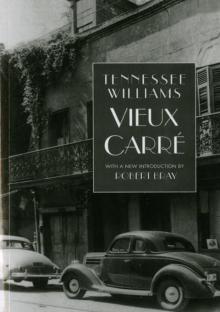 Vieux Carre
Vieux Carre The Night of the Iguana
The Night of the Iguana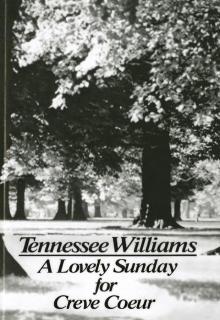 A Lovely Sunday for Creve Coeur
A Lovely Sunday for Creve Coeur Sweet Bird of Youth
Sweet Bird of Youth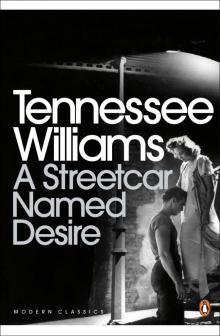 Streetcar Named Desire
Streetcar Named Desire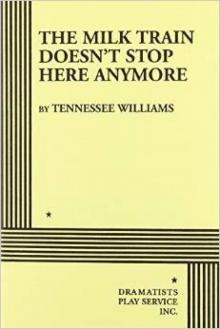 The Milk Train Doesn't Stop Here Anymore
The Milk Train Doesn't Stop Here Anymore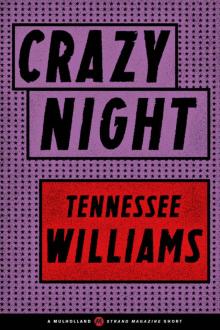 Crazy Night
Crazy Night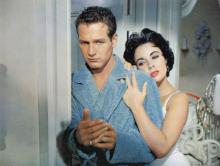 Three Plays of Tennessee Williams
Three Plays of Tennessee Williams A House Not Meant to Stand
A House Not Meant to Stand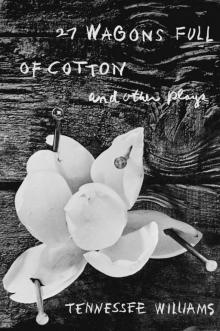 27 Wagons Full of Cotton and Other Plays
27 Wagons Full of Cotton and Other Plays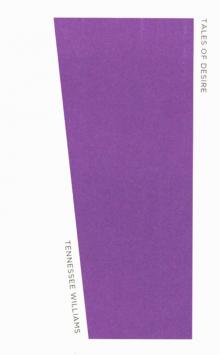 Tales of Desire
Tales of Desire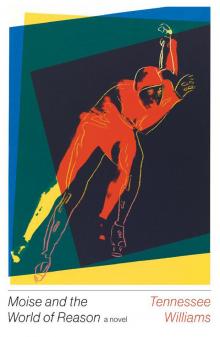 Moise and the World of Reason
Moise and the World of Reason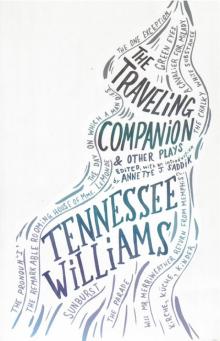 The Traveling Companion & Other Plays
The Traveling Companion & Other Plays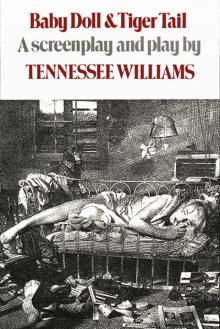 Baby Doll Tiger Tail: A Screenplay and Play by Tennessee Williams
Baby Doll Tiger Tail: A Screenplay and Play by Tennessee Williams Memoirs
Memoirs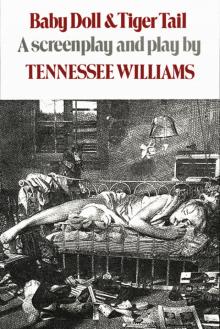 Baby Doll & Tiger Tail
Baby Doll & Tiger Tail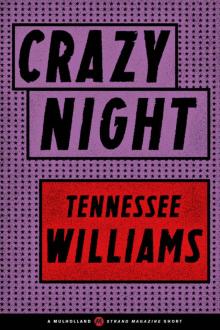 Crazy Night (A Mulholland / Strand Magazine Short)
Crazy Night (A Mulholland / Strand Magazine Short)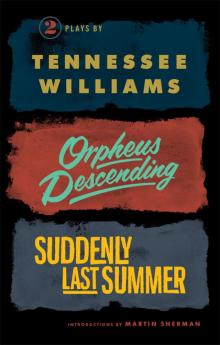 Orpheus Descending and Suddenly Last Summer
Orpheus Descending and Suddenly Last Summer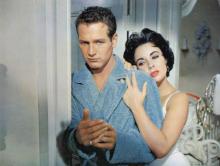 Three Plays
Three Plays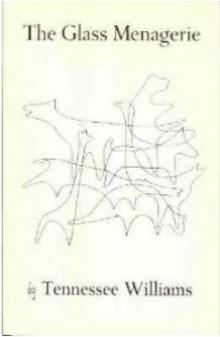 The Glass Menagerie
The Glass Menagerie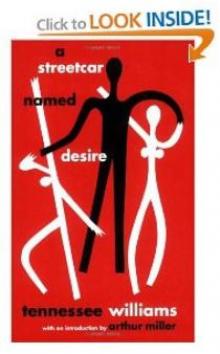 A Streetcar Named Desire
A Streetcar Named Desire